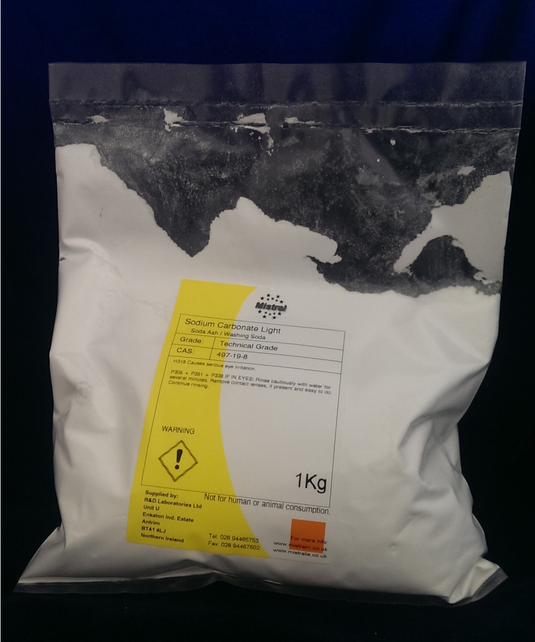Sodium Carbonate Light
Soda ash
Anhydrous Washing Soda
Technical grade
Sodium carbonate, also known as soda ash, is a white, anhydrous and hygroscopic powder with a purity. There are two forms of sodium carbonate available, light soda and dense soda (granular). It is soluble in water and solubility increases with temperature. The average particle size diameter (d50) of light sodium carbonate is in the range of 90 to 150 µm and of dense sodium carbonate is in the range of 250 to 500 µm. Sodium carbonate is a strong alkaline compound. The pKa of CO3 2- is 10.33, which means that at a pH of 10.33 both carbonate and bicarbonate are present in equal amounts.
Properties of sodium carbonate light:
- Synonyms: Soda ash; carbonic acid disodium salt; disodium carbonate; calcined soda;
- CAS No. 497-19-8
- EINECS No: 207-838-8
- Appearance: white fine powder
- Purity: 99+%
- Formula: Na2CO3
- Relative Density: 2.53 g/cm3
- Molar Mass: 105.99 g mol/1
- Melting point: 851 oC decomposes
- Solubility: soluble in water 106 g/l at 20C
- pH: 12 at 106 g/l at 25C
Uses of sodium carbonate:
GLASS MANUFACTURE: The most important use for sodium carbonate is in the manufacture of glass. When heated to very high temperatures, combined with sand (SiO2) and chalk (CaCO3), and cooled very rapidly, glass is produced.
SWIMMING POOLS & SPAS: Sodium carbonate is also used as a relatively strong base in various settings. For example, sodium carbonate is used as a pH regulator to maintain stable alkaline conditions necessary for the action of the majority of developing agents. It is a common additive in municipal pools used to neutralize the acidic effects of chlorine and raise pH.
USING pH increaser in pools: Test water pH which should be between 7.2 and 7.6. If below 7.2 add 1000g of powder per 100m3 of pool water. Dissolve powder in clean water and add solution while keeping pump and filters running. Wait for 2 hours and repeat test. If necessary repeat treatment.
TAXIDERMY: In taxidermy, sodium carbonate added to boiling water will remove flesh from the skull or bones of trophies to create the "European skull mount" or for educational display in biological and historical studies.
CHEMICAL LAB: In chemistry, it is often used as an electrolyte. This is because electrolytes are usually salt-based, and sodium carbonate acts as a very good conductor in the process of electrolysis. Additionally, unlike chloride ions which form chlorine gas, carbonate ions are not corrosive to the anodes. It is also used as a primary standard for acid-base titrations because it is solid and air-stable, making it easy to weigh accurately.
LAUNDRY & HOUSE HOLD CLEANING: In domestic use, it is used as a water softener during laundry by removing hard water ions. Without using washing soda, additional detergent is needed to soak up the magnesium and calcium ions. Called Washing Soda in the detergent section of stores, it effectively removes oil, grease, and alcohol stains.
Sodium carbonate is also used as a descaling agent in boilers such as found in coffee pots, espresso machines, etc. Sodium carbonate is used to encapsulate and kill mold. When mixed with water and put in a spray bottle, it is sold for its anti-mold cleaning ability. It is also used to blast off mold from wood or other materials.
Sodium carbonate may be used for safely cleaning silver. First, aluminium foil is added to a glass or ceramic container, and covered with very hot water and some sodium carbonate. Silver items are dipped into this "bath" to clean them, making sure the silver makes contact with the aluminium foil. Finally, the silver is rinsed in water and let to dry.
DYE INDUSTRY: In dyeing with fiber-reactive dyes, sodium carbonate (often under a name such as soda ash fixative or soda ash activator) is used to ensure proper chemical bonding of the dye with the fibers, typically before dyeing (for tie dyes), mixed with the dye (for dye painting), or after dyeing (for immersion dyeing). Works best for cotton and denim.
Other Applications
- Wetting agent for clay extraction.
Health & Safety
R-phrase(s): R36 Irritating to eyes.
S-phrase(s): S22 Do not breathe dust. S26 In case of contact with eyes, rinse immediately with plenty of water and seek medical advice.
PLEASE NOTE: This product is not for human or animal consumption.
